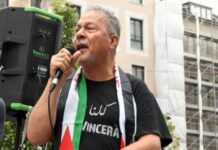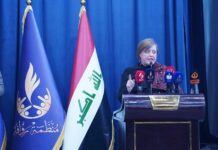
As Palestinians and their supporters around the world mark the 69th anniversary of the Nakba, the catastrophe of the occupation of Palestine and the forced displacement of over 750,000 Palestinian refugees from their homes, lands and villages by Zionist forces, Palestinian prisoners in Israeli jails enter their 29th day of hunger strike on 15 May 2017.
Palestinian prisoners have a long history of hunger strikes in Israeli prisons, stretching back to 1968. This strike, the Strike of Freedom and Dignity, was launched on 17 April 2017, Palestinian Prisoners’ Day, by approximately 1,500 out of the total 6,300 Palestinian prisoners held in Israeli jails. They are demanding basic human rights, including an end to the denial of family visits, proper health care and medical treatment, the right to pursue distance higher education and an end to solitary confinement and administrative detention, imprisonment without charge or trial.
35 more Palestinian political prisoners joined the strike on Sunday, 14 May, reported Asra Voice. The health condition of the strikers continues to deteriorate; a number of prisoners have lost 20 kg (42 pounds) in weight, while standing and walking is difficult or impossible for many. A number of prisoners in Nafha prison have fainted; two hunger strikers in the prison, Mohammed al-Ghoul and Yahya Ibrahim, received a legal visit on Sunday, in which they highlighted the deteriorating health of their fellow prisoners, most of whom are taken to a so-called “field clinic” that do not provide proper medical treatment. Issa Qaraqe of the Prisoners’ Affairs Commission demanded that all of the striking prisoners be transferred to civilian hospitals in the face of the escalating health risks, Ma’an News reported.
Some prisoners in Ohli Kedar prison have been denied access to salt for many days and are therefore consuming only water, as revealed by imprisoned Palestinian leader Ahmad Sa’adat. Palestinian prisoners on hunger strike have faced harsh repression, including the confiscation of personal belongings – sometimes including the salt necessary to preserve life and health, frequent repressive raids, arbitrary and abusive transfers, isolation and denial of legal and family visits.
Marwan Barghouthi, a prominent Palestinian political leader, a member of the Fateh Central Committee, and leader of the strike, received his first legal visit of the strike on Sunday. Since the strike began on 17 April, Barghouthi had been consistently denied legal visits despite court orders that the striking prisoners must be able to receive visits from their lawyers following legal challenges from Palestinian lawyers. Fellow prominent Palestinian leader Ahmad Sa’adat, the imprisoned General Secretary of the Popular Front for the Liberation of Palestine, also received his first legal visit since joining the strike on 4 May on Sunday, 14 May.
Palestinian lawyer Khader Shqairat visited Barghouthi in Jalameh (Kishon) prison, where he is held in isolation. Barghouthi sent a letter to his fellow hunger strikers, the Palestinian people and supporters of freedom around the world, calling for civil disobedience to support the prisoners, reported Ma’an.
Shqairat reported that Barghouthi said that repressive units invade his cell for “inspection” four times daily and that this is done in a particularly humiliating manner. He is strip searched by force while handcuffed and shackled at his feet. Barghouthi was held in a basement in the prison’s isolation section for four days until he stopped drinking water in order to be moved. He is also subjected to forms of noise harassment and abuse and must try to plug his ears with handkerchiefs. He also noted that Barghouthi’s cell is infested with insects and only one blanket available. All of his personal clothing and books have been confiscated. He has lost 12 kilograms (25 pounds) in weight since the beginning of the strike.
Barghouthi’s letter, issued from solitary confinement, emphasized the commitment of the prisoners to continue their struggle despite their difficult conditions, urging escalated action. Excerpts follow:
“I greet with great pride, admiration and reverence the Palestinian people, who have come out everywhere to support the prisoners, in Jerusalem, in the West Bank and Gaza, in 1948 Palestine, in the camps, the diaspora and countries of asylum, in the Palestinian exile communities around the world. I also greet with admiration, appreciation and pride the Arab peoples and their parties, trade unions and youth, and salute the popular solidarity in the Arab world. I also salute all of our friends of freedom in the world who express their solidarity with us in the battle for freedom and dignity in Palestine.
“In particular, I would like to salute the refugees of our Palestinian people, as we mark the 69th anniversary of the ethnic cleansing of the Nakba and renew our consistent position to uphold the sacred right of return of Palestinian refugees to their homes and lands from which they were forced in an attempt to eradicate and erase them as a people.
“I call on the movement to commemorate the Nakba and the popular movement in solidarity with the prisoners to develop their situation into a comprehensive national and civil disobedience that coincides with the half-century anniversary of the colonization of the Arab lands occupied in 1967.
“I would also like to pay tribute to the heroic prisoners on hunger strike, the knights of the intifadas and heroes of the resistance who hold onto burning embers in this epic of steadfastness and patience. ‘Victory is the patience of an hour.’ They are the ones who are writing a new, shining and honorable page in the history of the battles of the prisoners’ movement and the struggle of the Palestinian people for freedom and dignity. They are planting hope in future generations with their flesh and blood. I pledge that we will continue to fight for the freedom and dignity of Palestine until we achieve our goals. Nothing will break the will of the prisoners of freedom or that of our great people. I salute the freedom and dignity of Saba Obeid, who joined the ranks of the martyrs of Palestine, the purest heroes of us all, and I strongly condemn the ugly attacks on prisoners on hunger strike for just and human demands. They are abused, hundreds subject to transfers for 18 hours a day, barred from legal visits and held in solitary confinement cells with their tired and exhausted bodies. But I assure our people that all the cheap attempts at extortion, the cruel and bitter actions and the brutal conditions in which we live will only increase our determination….
“I call on the Palestinian people, as we are still in the stage of national liberation and liberation from occupation and colonialism, to launch the largest popular movement of comprehensive civil and national disobedience on the road of national liberation, on the 50th anniversary of Israeli colonization and with the approaching 70th anniversary of the struggle. This battle for freedom and dignity is an integral part of the struggle against occupation and to overthrow the oppressive apartheid regime in Palestine.”
Barghouthi also urged Palestinian national unity and warned against the resumption of negotiations while Israel refuses to recognize basic Palestinian rights.
Ahmad Sa’adat met with lawyer Farah Bayadsi of Addameer on Sunday, 14 May. The imprisoned PFLP General Secretary said that “the will of the strikers derives from the will of the Palestinian people, which has not been defeated and will not be defeated, and victory is inevitable.”
Sa’adat reported harsh conditions and denial of any meaningful medical treatment, noting that he and dozens of other strikers are isolated and consuming water only after their salt was confiscated by the Israeli prison administration.
Sa’adat also noted that the striking prisoners had refused to meet with delegates from the International Committee of the Red Cross (ICRC), who came for a visit with them, because the ICRC delegates refused to enter the prisoners’ sections and rooms to see for themselves the conditions of the striking prisoners’ detention. The striking prisoners rejected this position from the ICRC and demanded the ICRC be accountable to its responsibilities and those of its representatives in the protection of prisoners and their rights.
The prisoners are firmly adhering to their collective demands and their strike until victory, despite attempts by the prison administration to break the prisoners’ morale and the popular support for their struggle, Sa’adat said in the visit. Despite their fatigue and weight loss, Sa’adat emphasized that the hunger strikers’ morale remains high and their commitment firm in continuing the strike. .
The National Committee to Support the Prisoners’ Strike called for a commercial strike throughout the West Bank today, Monday, 15 May, from 11 am to 2 pm. The statement urged that Nakba commemoration activities become confrontations with the occupation in all locations and urged all merchants to commit to the campaign to boycott Israeli products.
International events are also continuing to support the prisoners’ strike, with many events jointly held to commemorate al-Nakba, demand Palestinian refugees’ right to return, and support the demands of the hunger strikers. On Sunday, 14 May, supporters of Palestine gathered in Vancouver, Malmo, Manchester, Donegal, Lurgan, Madrid and elsewhere in solidarity with the hunger strikers. The large national one-day hunger strike in South Africa, including government officials like Deputy President Cyril Ramaphosa, former political prisoners of the apartheid regime and veteran anti-apartheid struggles, launched at 6 pm on Sunday.
On Monday, 15 May, events and actions will take place in Cape Town, Johannesburg, Glasgow, Durham, Los Angeles, London, Istanbul, Sydney, Antwerp, Madrid, Athens, Montreal, Sao Paolo, Donosti, Toulouse and elsewhere. Samidoun has a list of global actions for Palestine and the hunger strikers available.
Discover more from Samidoun: Palestinian Prisoner Solidarity Network
Subscribe to get the latest posts sent to your email.




